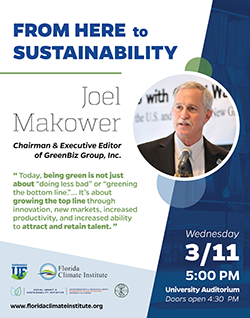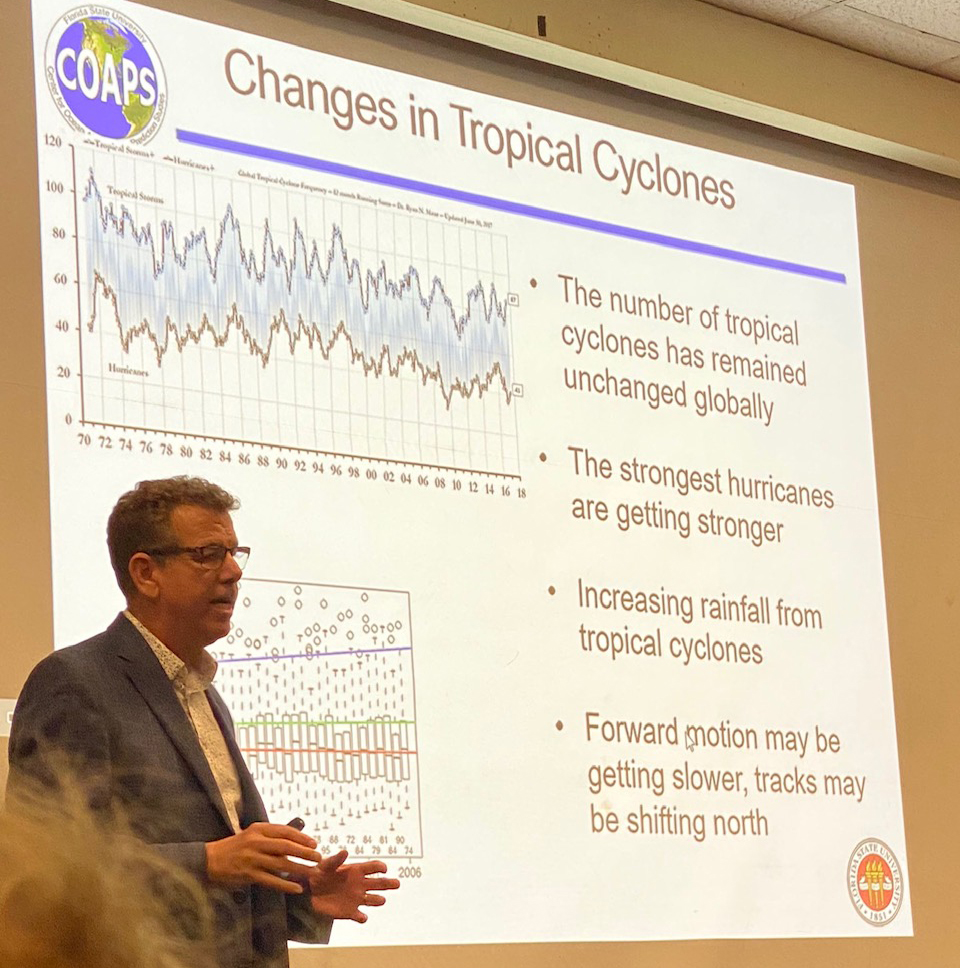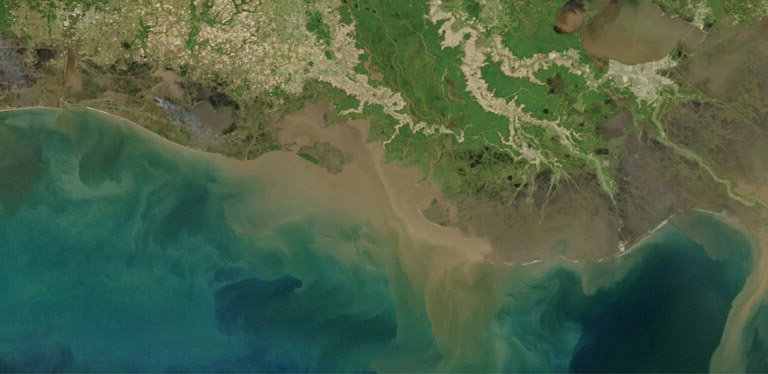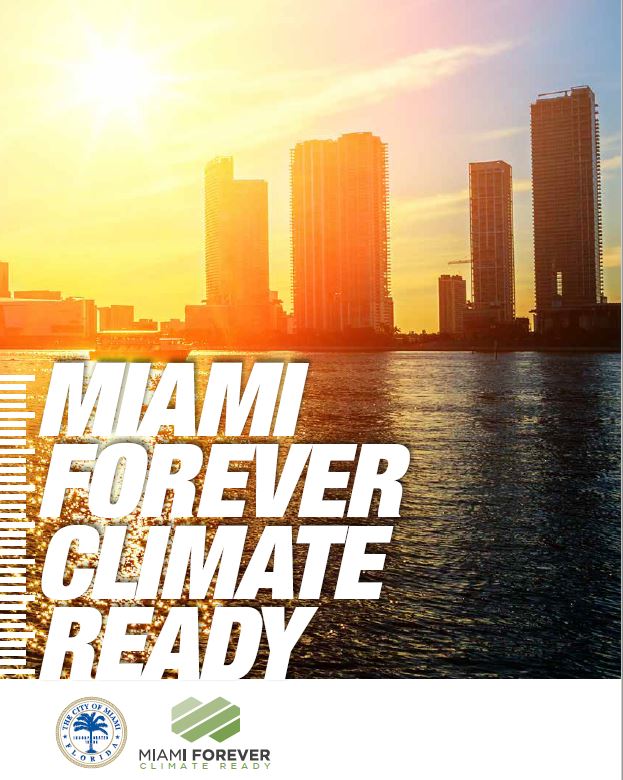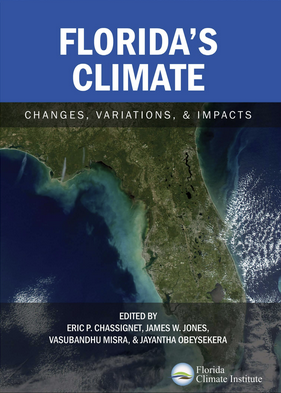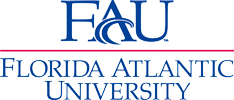 |
Talk: From Here to Sustainability
Nearly every company is assessing itself through the lens of sustainability. For a handful of leadership companies, it involves asking the question: "How do we compete in a world in which energy, water, materials, and toxicity are constraints to growth?" Today, being green is not just about "doing less bad" or "greening the bottom line." It's about reducing risk - supply chain, reputation, financial and more. It's about growing the top line through innovation, new markets, increased productivity, and increased ability to attract and retain talent.
|
Climate Change in Florida: What We Know (and don't know)
On January 29, Zierden addressed students, faculty, and visitors at the UF College of Journalism and the Graham Center. The talk, entitled "Climate Change in Florida: What We Know (and don't know)" was recorded and can be viewed at
https://www.facebook.com/UFJSchool/videos/538902266981398/
|
|
New Study: Call for Nominations Long-Term Environmental Trends in the Gulf of Mexico
The Gulf Research Program of the National Academies of Sciences, Engineering, and Medicine is pleased to announce the launch of a new study, Long-Term Environmental Trends in the Gulf of Mexico. This consensus study will assess the cumulative effects of multiple restoration projects; discuss potential impacts from both acute events and long-term changes; and consider synergistic and antagonistic effects across multi-decadal restoration activities and recommend adaptive management strategies. The program invites you to nominate experts to serve on this committee. Approximately 8-10 volunteer experts will be selected from fields including, but not limited to: ecosystem restoration and function; restoration monitoring and evaluation; ecosystem services; geomorphology; coastal processes; land use planning; natural resource management and policy; stakeholder engagement; data management, synthesis, and modeling. We welcome nominations of individuals from state agencies, non-governmental organizations, academia, and other sectors. Per the legal agreements that established the Gulf Research Program, no current officer or current employee of the U.S. Government can serve on this or other appointed committees of the Gulf Research Program.
For more information or to submit a nomination.
|
|
Intergovernmental Panel on Climate Change (IPCC) Review
The IPCC seeks expert comment on the first-order draft of the Working Group III contribution to the Sixth Assessment Report (AR6). The review runs from January 13 - March 8, 2020. Experts can register directly with the IPCC
here; an information note explaining the process can be found
here. Refer to the
decision document for the approved outline.The IPCC will soon release the Working Group I contribution to AR6 for Government and Expert Review: March 2 - April 26, 2020. USGCRP will manage this process on behalf of the U.S. Department of State. More information will be available on the
Open Notices page as the launch date approaches. Draft assessments do not represent approved products of the IPCC, and as such should not be cited, quoted, or distributed other than for review purposes.
|
|
UM Offering Master of Professional Science in Urban Sustainability and Resilience
The Master of Professional Science degree (MPS) in Urban Sustainability and Resilience is an interdisciplinary 36-credit program offered jointly by the College of Arts & Sciences' Department of Geography and Regional Studies and the School of Architecture. The curriculum leverages the knowledge, skills and hands-on practical engagement necessary for students working toward contributing to the urban challenges confronting cities on the front lines of climate change. For more information about the program, go to:
https://urb.miami.edu/
|
|
Miami Unveils New Climate Ready Strategy
The City of Miami has always been vulnerable to hurricanes, storm surge, and flooding, and we have a strong history of thriving in the face of adversity. However, over the past decade Miami's acceptance and response to climate change has emerged as a new factor influencing the growth, and future trajectory, of the City.
To ensure a sustainable and enduring future for the City and its residents, the City is taking bold steps towards implementing an innovative and holistic approach to resilience.The new Miami Forever Climate Ready Strategy, unveiled in January, is designed to reduce the increasing risks of flood, heat and storm impacts to the Magic City over the next 40 years. It will also ensure that Miamians continue to be engaged in the resilience process.
Read more about the City of Miami's Climate Ready Strategy.
|
|
Proposed Florida Climate Assessment
The proposed Florida Climate Assessment will:
- Produce a strategic tool with standards, data, analyses, andthresholds for use in planning, decision-making, setting research agendas, and use in public policy and legislation
- Ensure resiliency decisions are informed by the best available science through an iterative, stakeholder driven process that is easily updated and user-focused
- Use the best science in a manner that is responsive, supportive, and critical focusing on systems and not separate sectors
- Improve relationships between knowledge producers and users and yield better decisions and outcomes to build capacity and overcome barriers
We want to know your thoughts on the proposed Florida Climate Assessment and its potential value to your work and to the state of Florida.
Email us and please include your name, contact information, affiliation, and position.
|
|
Other Upcoming Events & Webinars
|
|
Job, Internship, and Fellowship Opportunities
|
|
Publications
Clark, P. U., Clark PU, He, F., He F, Golledge, N. R., Golledge NR, et al. (2020).
Oceanic forcing of penultimate deglacial and last interglacial sea-level rise.
Nature, 577(7792), 660+.
Cohuo, S., Macario-González, L., Wagner, S., Naumann, K., Echeverría-Galindo, P., Pérez, L., et al. (2020).
Influence of late Quaternary climate on the biogeography of Neotropical aquatic species as reflected by non-marine ostracodes.
Biogeosciences, 17(1), 145-161.
Fuentes, M. M. P. B., Godfrey, M. H., Shaver, D., Ceriani, S., Gredzens, C., Boettcher, R., et al. (2019).
Exposure of Marine Turtle Nesting Grounds to Named Storms Along the Continental USA.
Remote Sensing, 11(24).
Garner, S. B., Boswell, K. M., Lewis, J. P., Tarnecki, J. H., & Patterson III, W. F. (2019).
Effect of reef morphology and depth on fish community and trophic structure in the north central Gulf of Mexico Estuarine.
Coastal and Shelf Science, 230.
Mbuya, O. S. (Ed.). (2020). Strategies for Doubling the Farmers Income: A Gujarat Perspective. Azadpur, Delhi: Satish Serial Publishing House.
Moon, Y., Kim, D., Camargo, S. J., Wing, A. A., Sobel, A. H., Murakami, H., et al. (2020).
Azimuthally Averaged Wind and Thermodynamic Structures of Tropical Cyclones in Global Climate Models and Their Sensitivity to Horizontal Resolution.
J. Climate, 33(4), 1575-1595.
Ryan, S. J., Carlson, C. J., Tesla, B., Bonds, M. H., Ngonghala, C. N., Mordecai, E. A., et al. (2019). Climate Change Could Expose 1.3 Billion New People to Zika Virus Transmission Risk by 2050. In American Journal of Tropical Medicine and Hygiene (Vol. 101). National Harbor, MD.
Scheiner, S. M., Scheiner SM, Barfield, M., Barfield M, Holt, R. D., & Holt RD. (2020).
The genetics of phenotypic plasticity. XVII. Response to climate change.
Evol Appl, 13(2), 388-399.
Stathakopoulos, A., Stathakopoulos A, Riegl, B. M., Riegl BM, Toth, L. T., & Toth LT. (2020).
A revised Holocene coral sea-level database from the Florida reef tract, USA.
PeerJ, , e8350.
|
A Book from the FCI:
Florida's Climate: Changes, Variations, & Impacts
Florida's Climate: Changes, Variations, & Impacts provides a thorough review of the current state of research on Florida's climate, including physical climate benchmarks; climate prediction, projection, and attribution; and the impacts of climate and climate change on the people and natural resources in the state. The book is available for purchase in paperback and Kindle format at
Amazon.com.
Individual chapters may be accessed on the
FCI website.
|
|
About Us
The Florida Climate Institute (FCI) is a multi-disciplinary network of national and international research and public organizations, scientists, and individuals concerned with achieving a better understanding of climate variability and change.
Email: info@floridaclimateinstitute.org Website: floridaclimateinstitute.org
|
|
|
|
|
 |


